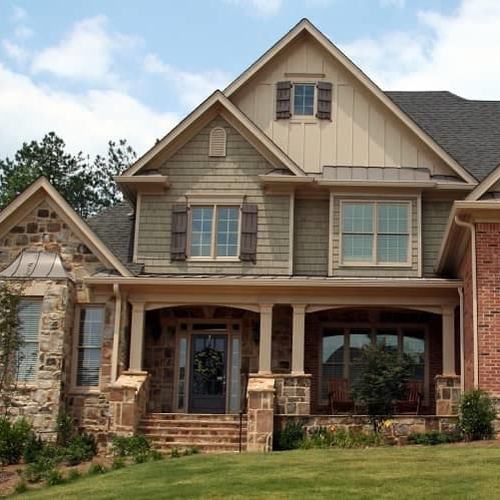Fixed-rate mortgage benefits and options
Contributed by Sarah Henseler, Tom McLean
May 10, 2025
•7-minute read

As of November 16, 2025, both Fannie Mae and Freddie Mac no longer have a minimum credit score threshold in their conventional loan eligibility guidelines. Loan approval will instead be based on an evaluation of overall credit risk factors.
Fixed-rate mortgages are the most popular type of mortgage, with 90% of buyers using one to buy a home. One of the top perks of a fixed-rate mortgage is they come with a predictable monthly payment. However, this loan type isn’t always ideal for every borrower and every situation.
What is a fixed-rate mortgage?
A fixed-rate mortgage is a home loan with an interest rate that is set when you first take it out and never changes. As a result, you’ll have a predictable monthly payment throughout the life of the loan. Changes in the market won’t affect your rate or monthly payment, which can keep your housing costs stable and help you budget for the future.
Current fixed-rate mortgage rates and types of loans
Here are our current mortgage rates for purchase and refinance loans as of April 23, 2025:
| Purchase rates |
|||
|---|---|---|---|
| Loan type | Rate | APR | Points (cost) |
| 30-year fixed | 7.125% | 7.449% | 2($5,500) |
| 20-year fixed | 6.99% | 7.408% | 2($5,500) |
| 30-year FHA | 6.49% | 7.382% | 1.875($5,157) |
| 30-year jumbo fixed |
6.375% | 6.558% | 1.375($13,063) |
| 30-year VA | 6.49% | 6.932% | 2($5,500 |
| Refinance |
|||
|---|---|---|---|
| Loan type | Rate | APR | Points (cost) |
| 30-year fixed | 6.625% | 6.967% | 2.25($5,625) |
| 20-year fixed | 6.375% | 6.769% | 1.875($4,688) |
| 30-year FHA | 6.625% | 7.533% | 2($5,088) |
| 30-year jumbo fixed |
6.375% | 6.557% | 1.375($13,063) |
| 30-year VA | 6.75% | 7.298% | 2($5,108) |
How does a fixed-rate mortgage work?
Borrowers who take out a fixed-rate mortgage lock in their interest rate at the beginning of the mortgage process. Once the borrower is approved for the mortgage loan, this interest rate will remain the same for the entire loan repayment term, unless they choose to refinance along the way.
What does that mean for you?
That means you’ll pay the same every month for your mortgage. Most fixed-rate mortgages are amortizing loans, which means your monthly payment will cover both your principal and interest. The amount you owe each month for your combined principal and interest payment won’t change, but the amount that covers principal and the amount that covers interest will shift over time.
In the first few years of making mortgage payments, most of each payment goes toward paying off interest. That’s because your loan balance is still high, so you owe more interest. As you pay down the loan, your loan balance will decrease, and you’ll owe less interest - so more of your payment will go toward the principal.
Other mortgage payment factors
Many buyers pay their property taxes and homeowners insurance using an escrow account. They pay extra each month along with their mortgage payment to cover these annual expenses. Once your property tax and homeowners insurance bills are due, they’ll be paid out of that account on your behalf.
When you’re figuring out how much house you can afford, it’s important to make sure you’re including these expenses in your mortgage payment.
If you make a down payment of less than 20% on a conventional loan, you’ll need to pay for private mortgage insurance. PMI protects the lender if you default on your loan. Your PMI payment will be added to your monthly payment. You can cancel this coverage once you have 20% home equity.
Example: How your payment changes over time
Let’s say you have a 30-year fixed-rate mortgage with a monthly payment of $2,463. Each month, you’ll pay $1,889 to cover principal and interest. When you begin paying off your mortgage, $1,575 of the $1,889 payment may go toward interest with just $314 going toward the principal.
For the purpose of this example, we used estimations for property taxes, homeowners insurance, and private mortgage insurance. These figures can change depending on your location and provider.
- Property taxes and insurance: $354
- PMI: $221
By the end of the loan’s amortization schedule, you’ll pay significantly more principal than interest. By your last mortgage payment, you’ll be putting $1,879 down to wipe out the principal and paying only $9 toward interest – a complete reversal of how you started.
How are fixed-rate mortgages different from adjustable-rate mortgages?
Another mortgage option that affects your interest rate is an adjustable-rate mortgage, or ARM. With an ARM, you’ll likely pay a lower interest rate during the introductory period, which can vary in length from one ARM to another. After the fixed-rate introductory period, the rate on an ARM can adjust up or down based on market conditions.
Whether you should go with a fixed-rate mortgage or an ARM will depend on several factors. Know these facts about ARMs before making your decision:
- ARMs are risky. The big risk with an ARM is that interest rates may go up. When that happens, you’ll pay more in interest every month if you’re past the introductory period (which typically lasts the first 5, 7 or 10 years of the loan). If mortgage rates are fairly low when you’re approved for the loan, you may be better off with a fixed-rate mortgage.
- ARMs are cheaper upfront. Fixed-rate mortgages typically have a slightly higher rate than ARMs starting out. However, once an ARM’s low introductory rate period ends, your rate may increase, causing your monthly payments to go up.
- ARMs can make sense for shorter home stays. An ARM’s low introductory rate can be very tempting, especially if you don’t plan on living in a home for a long time. If you plan on selling your house before the rate adjusts, you can save money with an ARM.
What are your fixed-rate mortgage options?
Most mortgage types come with a 15- or 30-year repayment term, though Rocket Mortgage® offers a YOURgage® loan that lets you customize your term anywhere from 8 to 29 years. Let’s explore the different types of fixed-rate mortgage options you’ll have to choose from.
Conventional loans
A conventional mortgage is issued by a private lender and is the most common type of home loan. It’s not backed by a government agency but does meet federal requirements that allow the lender to sell it to Fannie Mae or Freddie Mac.
Government loans
Federal Housing Administration loans, Veterans Affairs loans, and U.S. Department of Agriculture loans are all backed by the federal government. In some cases, government-backed loans have more lenient requirements than conventional loans.
30-year fixed
A 30-year fixed-rate mortgage, whether in the form of a conventional loan or a government-backed loan, is the most popular financing option for borrowers. You can keep monthly payments lower by choosing this term – even with a slightly higher interest rate. In most cases, you’ll have a higher interest rate the longer your repayment term.
15-year fixed
When you opt for a 15-year mortgage repayment term, you’ll save on interest compared with a 30-year mortgage. A 15-year fixed-rate loan typically features a lower rate than a 30-year loan, and because the loan has an amortization period of 15 years versus 30, you’ll save even more on interest. However, you’ll need to be prepared for a higher monthly payment since you’ll be paying back the loan in half the time.
How can I qualify for a fixed-rate mortgage?
If you think this mortgage option might be right for you, then here’s how you can qualify for a fixed-rate loan with Rocket Mortgage.
Check your finances
The first step toward getting a fixed-rate mortgage is figuring out what you can afford. To get a conventional loan, you’ll need a down payment of at least 3% the purchase price. If you’re purchasing a $350,000 home, that means you’ll need at least $10,500 to make a down payment. The other major up-front cost of buying a home is closing costs, which range from 3% to 6% of the purchase price.
Consider your financial history
Your credit report and financial history also will affect your eligibility for a fixed-rate mortgage – as well as the terms you’re offered. To get a conventional loan, you’ll typically need a credit score of at least 620. FHA loans come with slightly lower credit requirements. To get an FHA loan with Rocket Mortgage, you’ll need a credit score of at least 580.
Find a lender
There are many different banks and lenders that offer mortgages, though each set their own eligibility requirements. Since a mortgage is a long-term financial commitment, you’ll want to choose a lender that’s reputable. Learn more about working with Rocket Mortgage.
Get preapproved
A preapproval letter from a lender will tell you how much they estimate you can borrow to buy a home. While this is not a guaranteed offer, preapproval gives you a ballpark range of how much you can afford to spend. It also shows sellers that you’re serious about buying and likely can secure financing.
Consider loan terms
Fixed-rate mortgages come with different loan terms. For example, you’ll need to decide if you’d prefer a 30-year loan term or 15-year loan term. A longer term can help you keep your monthly payment low but will cost you more interest overall. A shorter term can help you save on interest, but you’ll need to be able to afford a higher monthly payment. Loan terms also vary depending on the lender, and one lender might offer you a lower interest rate than another. Be sure to shop around and compare offers so you can choose the loan terms that fit best for you.
Lock your interest rate
If you’ve chosen your lender and you’re happy with the interest rate they’ve offered you, then you might decide to get a mortgage rate lock. As the name suggests, a rate lock allows you to lock in your interest rate while you close on the home. That way, if interest rates increase between the offer and closing, you’ll get to keep the original lower rate. However, if interest rates don’t change or even decrease during this time frame, it wouldn’t be worth it to get the rate lock.
Close on your loan
During the underwriting process, the lender will review your finances to confirm that you can afford your mortgage. If everything checks out, you’ll be cleared to close on your house. On closing day, you’ll sign all the documentation, make your down payment, pay your closing costs, and officially close on your mortgage.
The bottom line: A fixed-rate mortgage is ideal if you prioritize predictability
A fixed-rate mortgage will give you more predictable monthly payments because your interest rate is set when you take out the loan and never changes. A fixed interest rate can help you budget for the future. If you lock in your rate when interest rates are low, then you won’t be affected by changes in the market. If you take out a fixed-rate mortgage and then interest rates drop in the future, you can still refinance to score a lower rate.
Need financing for your new home? Get started today with Rocket Mortgage.

Rory Arnold
Rory Arnold is a Los Angeles-based writer who has contributed to a variety of publications, including Quicken Loans, LowerMyBills, Ranker, Earth.com and JerseyDigs. He has also been quoted in The Atlantic. Rory received his Bachelor of Science in Media, Culture and Communication from New York University.
Related resources

10-minute read
9 tips for getting the best mortgage rate
There are many ways to secure a great mortgage rate, even with ongoing market volatility. Here are 9 ways to get the best mortgage rates available to you.
Read more
8-minute read
Breaking a fixed-rate mortgage: Can and should you do it?
There are a number of reasons why a borrower might want to break the loan agreement for their fixed-rate mortgage. Learn about whether this is possible here....
Read more

6-minute read
15-year vs. 30-year mortgage comparison
A 15-year mortgage is paid over 15 years, while a 30-year mortgage is paid over 30 years. Understand the pros and cons of both loan terms.
Read more